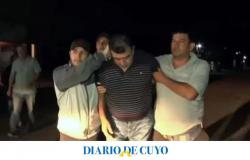9:01
“According to climate change models by 2050, if there is no increase in the resilience of the agri-food sector, the loss” for the Argentine economy “may be 4% of GDP annually.” This was said by Diego Arias, manager of the Agriculture and Food Practice for Latin America and the Caribbean at the World Bank. “It is a concern if there is no investment in resilient technologies,” he said.
The official spoke at the Rosario Stock Exchange, formulating the organization’s recommendations after a decade of productive decline in which Argentina fell from 3% to 2% of the world agri-food market.
“We see that what has not been achieved is a common vision” in a country that alternates “incentives and disincentives” to agriculture. “We call for consensus between public and private actors for a common vision on where to go.”
Arias noted that according to the WB report, the agri-food sector, Argentina represents 15.7% of GDP, 10.6% of tax revenues, 61% of exports and 17 to 24% of private sector employment.
The country “is the third largest net exporter of food in the world”, in a list headed by Brazil with US$84 billion, the Netherlands with US$34,884 billion, Argentina US$34,836 billion, and New Zealand US$32.1 billion. million and Canada US$31.1 billion.
However, after a decade with good international prices, “Argentina is the only one that decreases.” A 10% drop in typical products from the core zone impacts a 0.7% decline in the country’s entire GDP.
“You cannot relaunch the country’s economy without relaunching the agri-food sector,” Arias warned. He warned that “inclusion, poverty reduction and environmental sustainability are key” to that goal. He even detailed that “50% of what we Argentines eat comes from family farming,” which is the most exposed to impacts and floods or droughts, and the least assisted by public policies, with the consequent negative impact on social inclusion. and in the price of domestic foods.
The barriers to growth
“The barriers to negative growth are physical restrictions on exports of agri-food products and inputs, taxes on exports and imports, in addition to internal price controls and lack of investment,” Arias noted.
“We do not do macro fiscal analysis, but we point out that the export tax is one of the most distorting instruments known” and should be “the last public policy option.”
The specialist pointed out that the “1% drop in annual GDP in the last decade” is explained by “the impact on the agricultural sector of droughts and floods.” He called for a stable macroeconomy and predictable rules, in addition to “investment in competitiveness”, to achieve “resilience in the face of climate shocks that will intensify in frequency and intensity
 See alsoClimatic stability favors the soybean harvest in the central north of Santa Fe
See alsoClimatic stability favors the soybean harvest in the central north of Santa Fe Regarding resilience, he said that “the report emphasizes that public investment in innovation (research, extension and agricultural education) has fallen in relative and absolute terms, it is a third of what it was a decade ago. The good news is that We see a great dynamic of innovation in Argentina” although “it does not reach some areas and chains.”
He also called for “connectivity infrastructure” to accompany a “regulatory and fiscal framework” to enter the “bioinputs market” in “countries that are updating regulations.”
“The conditions are in place to stop losing, Argentina was at 3% of the global food market and we fell to 2%. The key elements are macroeconomics and fiscal pressure. There is much to do in resilience, inclusion and innovation, which are pieces key. The current situation is a floor. The ceiling is high and can be reached,” he concluded.
Vilella promises to return the “captured income”
The Secretary of Bioeconomy of the Nation, Fernando Vilella, said in Rosario that the government’s objective is to “return the capture of income” of the producers. He recognized “three mechanisms” by which the State does so: “export duties, the exchange gap and multiple trade regulations.”
The national official assured that the regulations “are being removed in these 6 months of President Milei’s government.” Although he acknowledged that “there are things to be resolved,” he said that “we are attacking each one of them” and recalled that the exchange gap, which exceeded 100%, dropped to averages of 30% with respect to the export mix “and we hope – with the macro evolving and inflation down – there is news
Regarding withholdings, he said that “there is a commitment that the president marked on Thursday (in Agroactiva), to the extent that the macro is organized.” And he rescued Luis Caputo’s announcement to lower the country tax by 10 percentage points, if the Bases law is tested.
 See alsoThe agribusiness of the northern center of Santa Fe will contribute 468.3 million dollars in withholdings
See alsoThe agribusiness of the northern center of Santa Fe will contribute 468.3 million dollars in withholdings Vilella emphasized “the emergence of credits at unusual rates, which in Argentina had disappeared, both in dollars and pesos. It is a difference with the financial system that captured resources and lent them to the State at exorbitant rates. That system is changing to favor producers, deregulate, doing so from the perspective of consumers who are demanding environmental care reflected in certifications and traceability.”
He proposed doubling exports by adding value, and gave as an example that 70% of corn is shipped as grain while having “60% less carbon footprint than our competitors. We are not appropriating its value,” he insisted.
He maintained that this is the way to “get out of the stagnation of the last decade and a half, from the poverty of 50% of the population, from migration as a result of not generating job opportunities and quality of life.”
Federalism and stability
At the Operations Center of the Rosario Stock Exchange, where the World Bank presented the report, Miguel Simioni called for building “a new federalism”, where the voices of each region are heard. The president of the host entity stated that “we must work together to create a stable and predictable regulatory environment that encourages investment, innovation and the adoption of technologies that drive productivity and sustainability.
The head of the Stock Exchange stressed the need to strengthen coordination with the different levels of government, and promote public-private collaboration “to ensure that the policies and programs we implement are effective and generate a real impact in the territory.”
Marianne Fay, Country Director for Argentina, Paraguay and Uruguay of the World Bank, said “the challenges are important: how to continue promoting competitiveness and, at the same time, protect natural resources; work on the resilience of communities and how to feed a growing population. We believe that actions and solutions to advance sustainable development have to arise from a dialogue between the public and private sectors and society as a whole,” he added.









